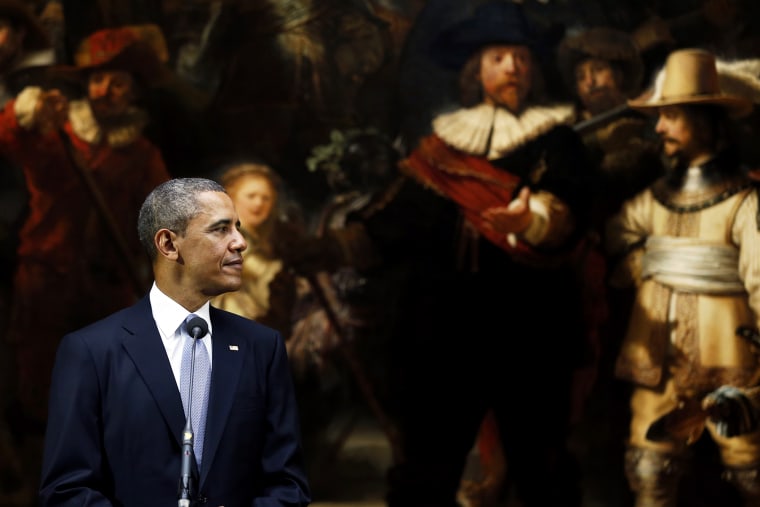President Obama kicked off his critical trip to Europe on Monday, seeking to reassure and rally the United States’ allies about the escalating crisis in Ukraine as fears continue to grow that Moscow’s aggression may stretch beyond Crimea.
The commander-in-chief arrived in The Netherlands in the early morning for a series of meetings and a summit on nuclear security, although Russia’s recent annexation of the Crimea region in Ukraine is expected to be a main focus at the event.
After meeting with Dutch Prime Minister Mark Rutte, the president said Europe and America are “united in imposing a cost on Russia for its actions so far.” The U.S. and the European Union have placed sanctions on more than two dozen aides and allies of Russian President Vladimir Putin, although some in the U.S. are calling for stricter sanctions on the country’s financial services sector. House Intelligence Committee Chairman Mike Rogers said on Sunday that the U.S. should even send small arms to the Ukrainian army so it can defend itself in the event of an invasion. Obama will be tasked with seeing how far the E.U. is willing to go in punishing Russia, one of its most valuable trading partners.
"The United States does not view Europe as a battleground between East and West, nor do we see the situation in Ukraine as a zero-sum game," Obama said in an interview with the Dutch newspaper de Volkskrant, published as he arrived in Amsterdam. "That's the kind of thinking that should have ended with the Cold War."
Obama also met with Chinese President Xi Jinping, who in the past has strongly aligned himself with Putin. China has, thus far, remained neutral on the crisis in Ukraine. Before the meeting, Obama said the two would discuss Ukraine, climate change and the denuclearization of North Korea. The president, treading carefully, said the two countries’ relationship is “as important as any bilateral relationship in the world.”
After the meeting, National Security Advisor Ben Rhodes told reporters that China did not commit to placing sanctions on Russia. Obama, he said, urged the Chinese leader to back the principles of sovereignty and terriortiral integrity for Ukraine, according to NBC News. Obama did not ask China for any specific action besides overall support of the United States' position, said Rhodes.
Following the Nuclear Security Summit on Monday, Obama met with the industrial G-7 nations to discuss further steps it can take to respond, and potentially further punish, Moscow.
After the meeting, the seven countries – Canada, France, Germany, Italy, Japan, the United Kingdom and the United States -- issued a joint declaration to reaffirm their support for Ukraine’s independence and to condemn Russia’s “illegal” attempt to annex Crimea.
“Today, we reaffirm that Russia’s actions will have significant consequences,” the statement added, saying the G7 remains “ready to intensify actions including coordinated sectoral sanctions that will have an increasingly significant impact on the Russian economy, if Russia continues to escalate this situation.” The countries added that unless Russia changes its course, they will not participate in a G8 summit in Sochi, Russia, which was planned for the summer.
U.S. Secretary of State John Kerry and Russian Foreign Minister Sergei Lavrov also met at the sidelines of the security summit in The Hague.
State Department spokeswoman Marie Harf said Kerry urged Lavrov to “de-escalate the situation in Ukraine.
Kerry, said Harf “expressed strong concern about the massing of a large number of Russian forces on the border and of the treatment of Ukrainian military forces, including many Ukrainian service members who are missing. She added that “Secretary Kerry pointed to the sanctions announced last week and the new executive order signed by President Obama that provides the flexibility to sanction specific industries if Russia continues to take escalatory steps.” Lavrov is expected to meet with his Ukrainian counterpart later in the day.
The summit in The Netherlands comes as Russian troops over the weekend stormed a Ukrainian naval base in Crimea. Interim Ukrainian President Oleksandr Turchynov said one of his air force commanders, Col. Yuliy Mamchur was “abducted” by Russian forces. The base was one of the last key Ukrainian military facilities in Crimea that was turned over to pro-Russian forces.
Ukraine on Monday ordered its troops to withdraw from Crimea – essentially declaring defeat -- after an estimated 20,000 Russian forces stationed themselves along Ukraine’s eastern border with Russia.
Ukrainian Foreign Minister Andrii Deshchytsia on Sunday told ABC’s Martha Raddatz on This Week that the chances of war with Russia are increasing.
Putin has pointed to a recent, controversial referendum, in which Crimea voted overwhelmingly to join Russia and secede from Ukraine. The White House has contended the vote is contrary to Ukraine’s constitution and was administered under threats of intimidation and violence.
Obama has a packed schedule. On Tuesday, the nuclear summit continues. On Wednesday, the president will attend an EU summit and deliver a speech in Brussels. Obama will meet with Pope Francis in Rome on Thursday before heading to Saudi Arabia on Friday to meet with King Abdullah.
